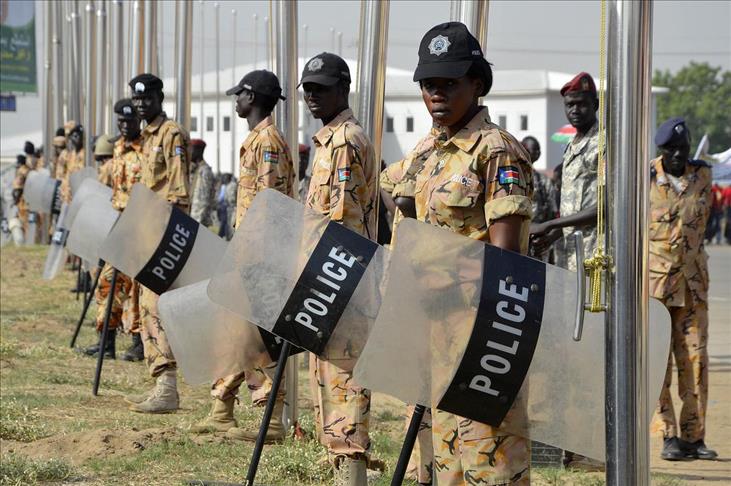S. Sudan's press freedom curtailed: Journalists
5 killings, 6 cases of harassments and 9 arrests reported in recent months

By Okech Francis
JUBA
As colleagues celebrate the World Press Freedom Day, many journalists operating in war-torn South Sudan continue to face intimidation, assault, arrest and harassment.
"People fear a lot to write on critical things and most of our articles are one sided," Julius Gale, a journalist working with The Junubi, a weekly newspaper in Juba, told The Anadolu Agency.
Gale, who was apprehended by the police while covering a fatal shooting in capital Juba in February, has resigned to phone interviews over sensitive issues, not willing to be at the scene of events.
"That day, I found the police were sealing off the place and then I pulled out my ID and a junior officer immediately reported to his commander," he recalled the incident.
"The commander ordered that I be put in a police patrol truck with heads down," Gale said.
"After about three minutes, he ordered that I be taken away and they drove me and left me somewhere far from the scene and warned me not to go back," he added.
According to Gale, the police officers said the incident was confidential and if they had wanted the media to cover, they would have called a press conference.
"Since then, I wait for conferences and when doing stories in the public, like public opinions, I use phone calls and even take pictures in places like the market using phones because security is always prowling around and may confiscate my gadgets and even arrest me," Gale told AA.
Oliver Modi, the chairperson of the Union of Journalists in South Sudan (UJOSS), said they have registered several incidences in the last 12 months.
"Journalists are not safe in the country," he told a Friday meeting of journalists and media organizations, also attended by UNESCO officials.
Modi listed five incidents of journalists' killings; six cases of harassments; nine arrests; two incidents of intimidations; seven incidents of newspapers confiscations; and eight media houses closures.
He also said journalists cannot be wholly exonerated, noting that South Sudan has "a big number of untrained journalists" reporting unprofessionally.
"As a result, we as journalists, have a bit of bias in our reporting. That is a fact and the truth about us and we cannot deny that to our public," said Modi.
The press freedom index released by Reporters without Borders in February ranked South Sudan the 125th out of 180 countries, down by 6 places from the previous year.
The group linked the deterioration to the ongoing war, "the radical polarization and constant harassment of news organizations."
South Sudan – which seceded from Sudan in 2011 – has been shaken by violence since late 2013, when President Kiir accused sacked vice president Riek Machar of leading a failed coup attempt against his regime.
Tens of thousands have reportedly been killed in subsequent violence, with some 2 million uprooted from their homes and 2.5 million at risk of starvation, according to recent UN estimates.
On-again, off-again peace talks in the Ethiopian capital have failed to reach a breakthrough.
Harassed
Jimmy, an online journalist who has asked to withhold his name for fear of reprisal, was reportedly picked up by security while covering an event, considered sensitive by the national security service, in March.
"I want to tell you the torture, abuse and harassment; it was not a good experience," he told AA.
He was reportedly told "you people want to sell the country" by reporting what is going on.
"When I was taken to the security center, the big officials said they should release me because they saw nothing wrong, but a junior officer insisted on his own and locked me up overnight," Jimmy recalled.
He suggested that the issue of tribalism is also taken into account in such situations.
"If you don't belong to their tribes, you are in for a very bad day," Jimmy said of the security personnel.
"Practicing in South Sudan is not easy and the worst part of it is that the media law is not yet being implemented," he lamented.
President Salva Kiir signed three media laws in September 2014 covering the right to access to information, public service broadcasting and media regulation.
Among other things, the laws call for the establishment of an independent body to oversee content and deal with complaints.
That body has yet to see the light and in its absence, the laws are not quite operational.
Jimmy, however, said he is not perturbed by harassments and intimidation.
"The reason I joined writing is to advocate for the voiceless," he told AA. "I will continue with my work. It is quite challenging but we cannot run away."
Alfred Taban, the chairman for the Association of the Media Development in South Sudan, has called for the enforcement of the recently-signed laws.
"Until these laws are implemented, we have very little to celebrate," Taban said at the Friday meeting.
South Sudan presidential spokesperson Ateny Wek Ateny, for his part, defended the country's media climate.
"The government does not curtail freedom of expression," he told AA at a press conference Saturday.
"If we are put [among] the least, then it is just the same stories always that both sides violated," Ateny said in reference to media reports which usually castigate the country's warring parties for cease-fire violations.
Anadolu Agency website contains only a portion of the news stories offered to subscribers in the AA News Broadcasting System (HAS), and in summarized form. Please contact us for subscription options.

